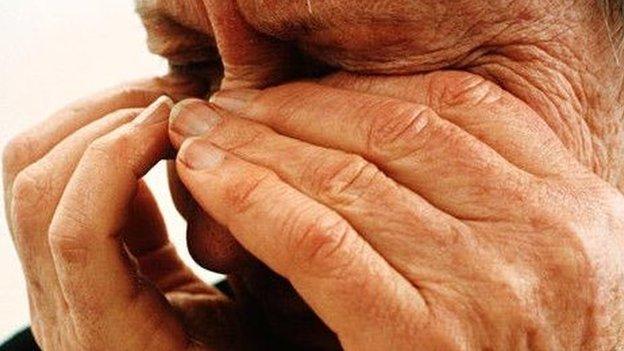Suicide risk reduced after talk therapy, study suggests
- Published

Talking therapy gives people time and space to explore their feelings
Talk therapy sessions can help reduce the risk of suicide among high-risk groups, suggests a US study.
Researchers from John Hopkins University tracked more than 5,000 Danish people who had attempted suicide and later received psychosocial counselling.
They found suicides went down by 26% after five years, compared to people who had no therapy sessions.
The findings are published in Lancet Psychiatry.
The participants in the study volunteered to have six to 10 talking therapy sessions at suicide prevention clinics in Denmark.
Their outcomes were compared with around 17,000 people who had attempted suicide but had not gone for treatment afterwards.
Participants were then followed up for up to 20 years.
Fewer suicides
The aim of this therapy is to give people time and space to talk about their troubles and explore difficult feelings with a trained professional.
During the first year, those who received therapy were 27% less likely to attempt suicide again. They were also 38% less likely to die of any cause.
After five years, this same group saw 26% fewer suicides. Ten years later, the positive effects of the therapy were still evident.
Dr Elizabeth Stuart, study co-author and associate professor in the Bloomberg School's department of mental health, said the long-term follow-up was ideal for gathering information on which suicide prevention treatments worked.
"Our findings provide a solid basis for recommending that this type of therapy be considered for populations at risk for suicide," she said.
Her colleague Annette Erlangsen, also from Johns Hopkins Bloomberg School of Public Health, said: "We know that people who have attempted suicide are a high-risk population and that we need to help them. However, we did not know what would be effective in terms of treatment.
"Now we have evidence that psychosocial treatment - which provides support, not medication - is able to prevent suicide in a group at high risk of dying by suicide."
They said it was likely that providing a safe, confidential place to talk was the key to the success of the therapy sessions.
But the researchers say they plan to gather more data on which specific types of therapy work best.